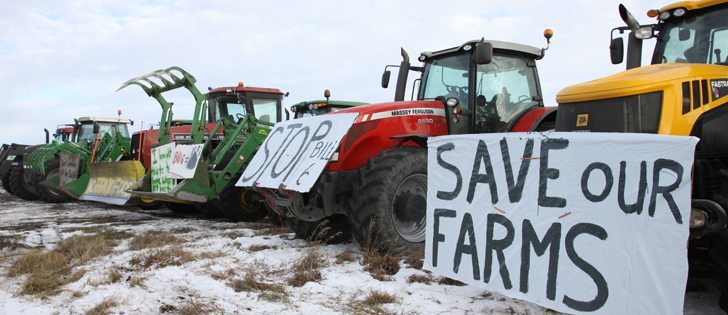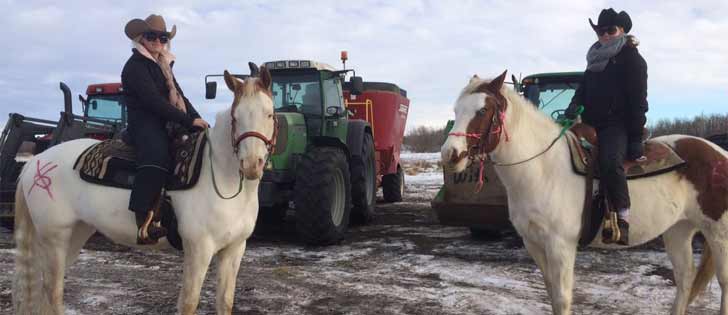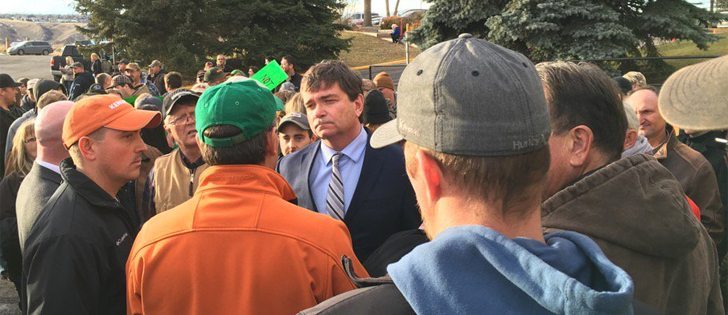The bill, designed to protect paid farm workers, sparked protests and threats against members of the NDP government
Farmers drove their trucks down highways, parked their tractors outside meeting halls, carried signs on pitchforks, created Facebook pages and presented more than 22,000 signatures in the legislature, all in an effort to kill a controversial Alberta farm worker bill.
But in the end, Bill 6, the Enhanced Protection for Farm and Ranch Workers Act, passed third reading Dec. 10 44-29, almost a month after it was introduced on a farm north of Edmonton.
Once proclaimed, farmers with paid employees will be required to have Workers Compensation Board coverage for their employees by Jan. 1, and the province’s 43,000 farms will be required to follow as yet unknown occupational health and safety and labour standards.
Read Also

Farming Smarter receives financial boost from Alberta government for potato research
Farming Smarter near Lethbridge got a boost to its research equipment, thanks to the Alberta government’s increase in funding for research associations.
It’s the unknown details that continue to worry farmers.
Kent Erickson, chair of the Alberta Wheat Commission, said the past two weeks were a whirlwind of legislation, followed by amendments exempting farm families from WCB and occupational rules.
Farmers, ranchers and agriculture groups now need to sit back and see what it all means.
“Now what? What are the amendments truly going to be getting at?” said Erickson.
“What will it mean for us?”
Erickson attended the government consultation meeting in Vegreville and noticed a level of dis-trust and wariness between the government officials trying to explain the bill and farmers opposed to the bill.
“It was emotional,” said Erickson, who saw little value in the town hall style meetings, which became a forum for anti-government sentiment rather than about writing a better farm bill.
“The protestors lost sight of the end game. The goal was to make a better bill that we can make for the farmers. Unfortunately, for some people the goal was to end the NDP government. It’s too bad.”
Erickson worried that 30 years spent building an image of agriculture as a viable, professional business have been cancelled out by a couple weeks of damage caused by online death threats to the premier and farmers at the public meetings bragging about unsafe practices disguised as character building.
Erickson said he couldn’t believe the audience applauding a 10-year-old boy who stood up at the Vegreville meeting to brag about how he could drive a 13-speed truck loaded with bales.
“That kind of example is totally illegal if he took the rural roads,” he said. “We’re giving excuses to urban consumer that make us look terrible.”
In an interview after the bill passed third reading, Alberta premier Rachel Notley said the bill was about protecting paid farm workers rather than dictating how families run their farms.
Notley admits the omnibus bill covering workers compensation, health and safety, labour relations and employment standards was handled badly from the beginning.
“It would have been better if we would have launched this bill in better form, but when we understood the issues with it, we moved to correct them with an amendment to make its intent clear,” said Notley.
The government was forced to add amendments to the bill making it clear it would cover only paid farm workers and not stop neighbours from helping neighbours and children from working with their 4-H calf or helping collect eggs.
“Bill 6 will ensure … wage earning workers killed or injured on the farm will be compensated. It allows people to refuse unsafe work and it will phase in protection similar to those in other provinces after robust consultation,” said Notley.
The political damage has been done for many farmers, and the NDP government was seen as out of touch with rural Alberta and farmers.
The amended bill allows Occupational Health and Safety officials to investigate accidents and deaths on farms with paid farm workers but not accidents and deaths on family farms and Hutterite colonies.
Three sisters died in a farm accident near Withrow and a 10-year old boy died on a Hutterite colony in Lougheed within the past six weeks. Under the bill, neither accident would be investigated.
“Bill 6 is focused on protecting the rights of paid farm workers,” Notley said.
“There is no question both of those instances were traumatic and worrisome to the people of Alberta, but those could have easily occurred on an acreage owned by someone that is not a farm, occurred in a back alley in an urban, downtown community.
“That is about the relationship between parents and children and that is not what this bill is about. This bill is correcting the long, unmet need to protect vulnerable paid farm workers who are obliged to follow the instruction of their employers at risk of losing their job if they don’t. That is a different issue.”
Erickson said the commission has told the government it supports mandatory insurance, either through WCB or private insurance. It also supported OHS’s ability to investigate all farm accidents to allow the industry to improve farm safety.
“Now it’s not a safety bill, it’s a labour bill,” he said.
Wildrose leader Brian Jean said most Albertans clearly oppose the bill, and the party will continue its opposition.
“I am very proud to say Wildrose was the first party to oppose Bill 6 and lead the charge against the bill,” said Jean, whose MLAs have hosted their own town hall meetings to allow farmers to voice their concerns about the bill.
“Farmers and ranchers had one simple request: kill Bill 6 and consult with farmers and ranchers.”
The government will launch a new round of consultation sessions once the bill is passed to draft detailed regulations for the health and safety and labour requirements.
Erickson hopes there will be a better flow of details between the government, industry sectors and producers.
“Maybe this is a wakeup call that farmers need to be more engaged in their producer groups.”
Alberta Beef Producers said in a newsletter: “Going forward, the government will face a tremendous challenge gaining the trust of thousands of farmers and ranchers who feel that their voices were not heard on Bill 6.”
The group said it would work with other commissions to ensure “regulations respect the unique nature of farm and ranch work and are practical for farmers and ranchers.”
Bob Barnetson, associate professor of labour relations at Athabasca University, said the opposition to Bill 6 is about more than farm safety; it’s about troubling economic times in agriculture, especially small family farms.
“This bill provides them with a target to vent their anger, not just the specifics of the bill, but the economic stress that small farms are in,” said Barnetson.
“That explains the amount of resistance and the degree of anger that has been shown, a degree of anger which is all out of proportion to what the bill actually does. Some of the backlash is frankly insane, the idea that health and safety is a pretext for seizing guns or expropriating land and force wind farms on the farmers.”
Barnetson lays part of the blame on the former Progressive Conservative government, which, unlike other provinces, didn’t gradually implement changes to farm safety legislation and labour relations while in power.
“The Conservatives have had 44 years to address this. Hundreds of farm workers and farm people died because of their inaction, and they should be profoundly ashamed of that.”
















